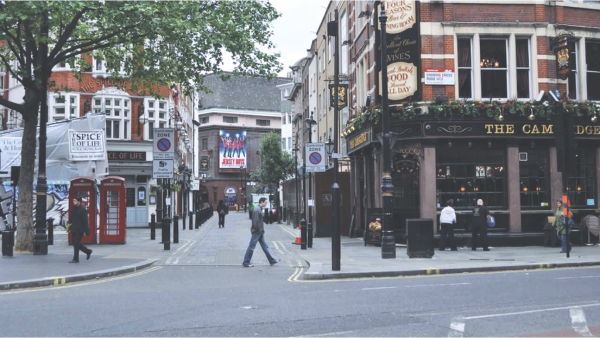| Home - Back Issues - The Team - Contact Us |
 |
| Volume 11 |Issue 18 | May 04, 2012 | |
|
|
Musings Being in London, Once Again . . . Syed Badrul Ahsan
It was a rain-filled afternoon when I went looking for my favourite bookshops on London's Charing Cross Road last week. There was the typical London weather, with people shielding themselves from the rain under umbrellas, of which you could see a ubiquity. And, of course, there was the usual brisk movement of people, a trait you spot usually in the West, especially in women. There is always a thing about smartness, which induces some of the most intense passion to arise in you. That brisk sound of shoes as western women walk by or past you never ceases to excite the imagination. And that precisely was what I went on watching last week, even though the rain came down in torrents, all across London. And then, of course, there are the books. You realise perfectly well that prices have gone up in recent years, even of the paperbacks you generally and cheerfully went for at Waterstone's or Foyle's or even at WH Smith only a year ago. But, again, how can one who has read all his life stay away from books, despite all that prohibitive price associated with buying them? The fortunate part of being in love with books comes, though, with being part, so to speak, of the bookshops selling old books such as those on Charing Cross Road. That is the beauty of civilisation. A nation which cheerfully offers you a plateful of books is one that can go through no moral or intellectual decline. In Britain, in the United States, in India there is always that feeling that politics and the state, along with the people constituting the state, will have little reason to look back or slide back simply because the books are there. A citizenry brought up on books, on the reading and writing of it, is fundamentally one whose place in history is assured. Which makes you think of our very own Dhaka, where books are swiftly going out of fashion and bookshops are being pushed through something euphemistically called downsizing. That is only another name for closure. Be it in Shahbagh or Gulshan or Dhanmondi or elsewhere, the intellectual poverty which hits you as you go looking for books to buy is overwhelming. There is that certain apprehension in you of a concerted move being underway to deprive people of books, of the opportunity of reading and thereby turning into powerhouses on their own. Nothing could be sadder than walking all over town, or a part of town, in search of a bookshop and then coming upon the discovery that there are not any. It is a situation I once ran into in Islamabad, where I frantically looked for a bookshop one evening right in the centre of town. I did find one, but its stock quite did not satisfy me. One wonders if things have changed for the better since. That said, there is always Kolkata for us. The sheer culture of the place, the historicity associated with it, is all you require to satisfy the needs of your soul.
And the soul is what matters in London. As I flip through the pages of a biography of Marie Antoinette by Lady Antonia Fraser, I am reminded once again of the old Samuel Johnson dictum: anyone who is tired of London is tired of life. Now, there's an argument you cannot dismiss out of hand. Observe the excitement with which Londoners these days are planning to celebrate the majesty of the Olympics in their great city. A whole expanse of desolation in the eastern end has been cleared and transformed into modernity, through the building of the Olympic Park, which is proof once again that history is a combination of the ability to change and a willingness to preserve heritage. Everywhere I have gone in these past couple of weeks — and that has included the Foreign and Commonwealth Office, the Olympic Park, the offices of the engineers and architects behind the huge enterprise — I have noticed ingenuity and competence at play. The key word is legacy. Everyone you meet, everyone linked in some way or another with the Olympics will assert over and over again how people mean to have the Games serve as a projection of legacy, of heritage, as Britons have known it. Respect for history is what civilised nations adhere to as a matter of principle. And Britons have been doing that very well. In London, you get to realise the universality of the human race. The cosmopolitanism is striking. As you walk through a tube station, expecting to catch an onward train after you have alighted from one, you hear Polish behind you even as some African voice before you makes its presence known. On the streets, you pass by proper Englishmen and then, suddenly as it were, you realise you are listening to some very good Bengali. You turn, to be cheered by the sight of someone in deep conversation, in Bengali, with his compatriot. It is an image you will not likely get anywhere else. But, yes, you do get something of the sort, albeit on a smaller scale, in Kolkata, where English, Hindi, Urdu, Gujarati, Bengali and what not remind you of the reasons why Kolkata has mattered in history — and matters still. Ah, pardon me, but I must get back to that other book I brought home from Charing Cross Road the other day. It is a biography of Egypt's last, pretty unfortunate monarch, King Farouk, by William Stadiem. Gamal Abdel Nasser is about to rise out of the mists of time. The writer is Executive Editor, The Daily Star.
Copyright
(R) thedailystar.net 2012 |

